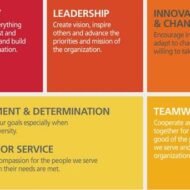Posted by Managementguru in Business Management, Entrepreneurship, Human Resource, Organisational behaviour, Principles of Management, Training & Development
on Mar 30th, 2014 | 0 comments

Values and Beliefs in Organizations What are Values and Beliefs in an Organization: An organisational value is “a belief that a specific mode of conduct is preferable to an opposite or contrary mode of conduct.” Infosys Narayanamoorthy on Value System : Our team was unique in our commitment to a strong value system. We believed in putting the interest of the company ahead of our own interest. We believed in legal and ethical business. A sound value system is what differentiates long-term players from others. Core Values of an Organization: Increasingly, organizations are setting out the core values that they think should govern the behavior of all their employees. Value statements may be produced which define core values in areas such as: Care for customers Concern for people Competitiveness Enterprising Excellence Flexibility Growth as a major objective Innovation Market/customer orientation Productivity Quality Teamwork But, is that all? By just defining what you think is important to guide the action of your employees may not suffice the cause. How do you put them into action! That’s where the secret lies. Imitating the Boss: How do you make people do what you want them to do! Just by being a precedence or role model for your followers, is that not true? The best example that can be cited is the school atmosphere, where the kids take to their teachers. They simply, blindly follow or imitate whatever their masters do. I think IMITATION is the right word, because it makes people easily inclined to the behavior that is appreciated by the organisation’s atmosphere. When you imitate your boss you get a surreal feeling of being a boss at least for that time being. Coercion is not the Right Approach: It is a general fact that it is very difficult to train or mould people the way we want to. And again it can be argued that people can be trained or molded very easily when you have the right kind of motivation and guidance. The core values should be INBUILT; it should be there RIGHT FROM THE START. If you have able managers to run your teams it becomes a cake walk for you to train the individuals without much COERCION. The authority and influence which the team leader has over the team says it all. Influencing the Employees the Right Way: Everybody in an organization plays their own role in cherishing the values imbibed and focus on achieving results, and keenness to “GET GOING AND KEEP GOING”. High work output is expected from a clerical staff, the Supervisor can be depended on for effective organization and control of teams and their work. THE MANAGER is clear about what “success “means for the business and is resourceful in overcoming obstacles. THE SENIOR MANAGER maintains focus on the “BOTTOM LINE” despite continuous changes to procedures and systems, and the EXECUTIVE is focused on results even when dealing with very diverse complex tasks and proactive in tackling mistakes. Performance of Value Oriented Organizations: Value Oriented Organisations perform definitely better than others and achieve their targets in a quick manner. Values give direction to the firm backed up by solid principles to guide the action of the employees and also the commitment and determination to achieve whatever is due. Reliance Industries Limited stands as a testimony for a single man’s dream and vision and his core value was CUSTOMER SATISFACTION. To scale to greater heights, you also need STRONG WILLED PEOPLE RIGHT ATTITUDE ACTION PLANS STRATEGIES PERSISTENCE DETERMINATION and PASSION Values add integrity and honor to your organization and you should always remember that to hold your values you...

Posted by Managementguru in Business Management, Entrepreneurship, Human Resource, Leadership, Principles of Management, Training & Development
on Mar 18th, 2014 | 0 comments

Executive Development – Options are Wide Open Who is an Executive: A person or group having administrative or managerial authority in an organization. While “executive” and “manager” and “leader” are often used interchangeably, “executive” is commonly used to signify the top 5% to 10% of the organization. Executive Development : aimed at developing the skills and competencies of those that (will) have executive positions in organisation. Capabilities of a Good Manager: A good manager can make an organization grow, survive and shine amidst tough competition, if he is bestowed with corporate competencies such as perseverance, capacity to put in hard work, sense of loyalty and responsibility, all of which may be inherited or acquired qualities. Loyalty stems from internalized morality that may be a result of his value system. Executive success is what the organizations should aim for, and firms should try to figure out the fundamental components that make up the success formula or equation. Road to Self-Development: In less developed countries, employees are more than satisfied if they are provided with a job that offers safety and security. Their thinking is restricted to mere physical and biological comforts and does not go beyond that point, where self development and self-actualization come into the picture. In developed countries, the situation is quite different, where the workers aim for empowerment and look for reasons that motivate them to do a job. Money also has its due role to play, and people whose wages are very meager cannot be expected to aim for empowerment, where their single motive is mere survival. Abraham Maslow’s Point of View: Abraham Maslow puts forward the hierarchical needs theory, arguing that, there are five levels of needs for people in general, right from physiological needs at the bottom of the pyramid and need for self actualization at the top, and safety, security and esteem needs coming in between. He points out that, once a need is satisfied, it ceases to be a motivator. This is so evident in our day to day lives, where wants and needs never cease to exist and once a want is satisfied, human mind wanders to catch hold of another. So, organizations should understand and analyze, what factors best motivate their employees, particularly their managers (who might serve as a source of inspiration to their subordinates).It should be remembered that non-availability of jobs leads to dissatisfaction whereas availability of jobs need not motivate employees. Some factors which have been proven to be real motivators are as following: Recognition Opportunities for self development Additional responsibilities(lateral expansion) Timely rewards(in terms of money and appreciation) Security Inculcating a sense of belongingness Conducive corporate atmosphere Corporate culture Good human relations Economic burden makes people less enthusiastic and anxious in developing countries and this hinders them from delivering to their fullest potential. Also the bureaucratic approach followed by conservative firms, autocratic leadership style and lack of supportive atmosphere make people work like automatons devoid of creativity. Such firms may show good results in terms of productivity initially, but in due course has to pay the price, in terms of absenteeism, high attrition rates and less efficiency. It has been proven that job satisfaction is directly proportional to efficiency. When people find a job tedious and monotonous, they tend to lose interest, which will be evident from their lack lustrous performance. Performance management has its bearing on executive success and by providing with ample scope for career advancement and autonomy; managers prove their mettle even within limited scope of resources. Acceleration of executive change implies the development of the executive mind for performing managerial activities in a better way. Note : A survey of CEOs in Fortune 500 enterprises indicated that executives spend little time with their...




